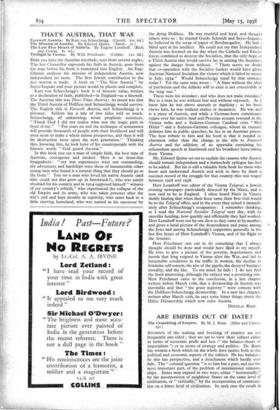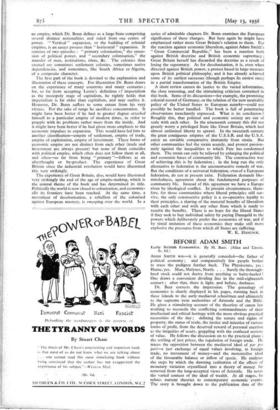ARE EMPIRES OUT OF DATE ?
STUDENTS of the making and breaking of empires are too frequently one-sided ; they are apt to view their subject either in terms of economic profit and loss (" the balance-sheets of imperialism ") or in terms of strategy and politics. Dr. Bonn has written a book which on the whole does justice both to the . political and economic aspects of the subject. He has balance ; . he also has perspective, and a detachment which hardly ever fails. The " colonial question " is to him but a part, and not the :2 most important part, of the problem of international relation- - - ships. States may expand in two ways, either " horizontally," by the incorporation of neighbour States on the same level of civilisation, or " vertically," by the incorporation of communi- ties on a lower .leyel of civilisation. In each case the result is an empire, which Dr. Bonn defines as a large State comprising several distinct nationalities and ruled from one centre of power. -" Vertical" expansion, or the building of colonial empires, is an easier -process- than " horizontal " expansion. It consists of two episodes : " primary colonisation," the exten- sion of political power, and " secondary colonisation," the transfer of men, institutions, ideas, &c.. The colonies thus created are sometimes settlement colonies, sometimes native dependencies, and sometimes, like South Africa or Algeria, of a composite character.
The first part of the book is devoted to the explanation and illustration of these concepts. For illustration Dr. Bonn draws on the experience of many countries and many centuries ; for, so far from accepting Lenin's definition of imperialism as the monopoly stage of capitalism, he rightly holds that imperialism is far older than capitalism, and may outlive it. However, Dr. Bonn suffers to some extent from his very virtues. For the sake of range he sacrifices concentration. It might have been better if he. had- in greater degree attached himself .to a particular :empire of modem times,. in order to grapple with its problems rather more from the inside. And it might have been better if he had given more emphasis to the economic inipulses to expansion. This would have led him to another classification--enipire of settlement, empire of trade, empire of exploitation, empire of investment. These forms of economic empire are not distinct from each other-. (trade and investment are always present) but none-of them coincides with political empire, Which often does not follow them at all, and often—so far from being " primary "follOws as an afterthought or by-product. The experience of Great Britain since the industrial revolution would have illustrated this very strikingly. •
The experience-of Great Britain, also, would have illustrated very strikingly the end of the age of empire-making, which is the central- theme of the book and has determined its title. Politically the world is now closed to colonisation, and economic- ally pits frontiers have been reached. At the same time, a moveitient of decolonisation, a rebellion of the colonised against European mastery, is sweeping over the world. In a series of admirable chapters Dr. Bonn examines the European significance of these changes. But here again he might have emphasised rather more Great Britain's relation to them. For the reaction against economic liberalism, against Adam Smith's " Great Commercial Republic," has been a reaction both against British • doctrine and • British economic supremacy ; Great Britain herself has discarded the doctrine as a result of losing the supremacy. As for decolonisation, it is, even when directed against British power, a protest based in large measure upon British political philosophy, and it has already achieved some of its earliest successes (though perhaps Its easiest ones) in a partial transformation of the British Empire.
A short review cannot do justice to the varied informittion, the close reasoning, and the stimulating criticism contained in this book. Some of its discussions—for example, the promising colonial record of Germany, or the relation of the new neutrality policy of the United States to European autarky—could not possibly be better handled. The book is full of penetrating observations trenchantly expressed. What is its conclusion ? Roughly this, that political and economic society are out of scale with each other. In the nineteenth century this did not greatly worry a privileged State like Great Britain, which had almost unlimited liberty to sprawl. In the twentieth century the great contiguous empires of the U.S.S.R. and the U.S.A. enjoy an enviable comparative immunity from strain. But other communities feel the strain acutely, and protest passion- ately against the inequalities to which Fate has condemned them. The strain can only be relieved by enlarging the political and economic bases of community life. The constructive way of achieving _this is by federation ; in the long run-the only alternative to federation is the unconstructive remedy of war. But the conditions of a universal federation; even of a European federation, do not at present exist. Federation demandi like- mindedness, agreement about the _ fundarnental purposes of community life. Instead of this agreement we have a Europe riven by ideological conflict. In present -circumstances, there- fore, for those communities where liberal- principles still sur- vive, the only constructive policy is a co-opeiative loyalty to their principles, a sharing of the material-benefits'of liberalism with each other and with any other State which is ready to receive the benefits. There is no hope for the liberal States if they seek to buy individual safety by paying Panegeld to the powers which deliberately prefer the economics of war,- and if by timid imitation of these economics they make still more explosive the pressures from which all States are suffering.
W. K. liANCOCK.















































 Previous page
Previous page